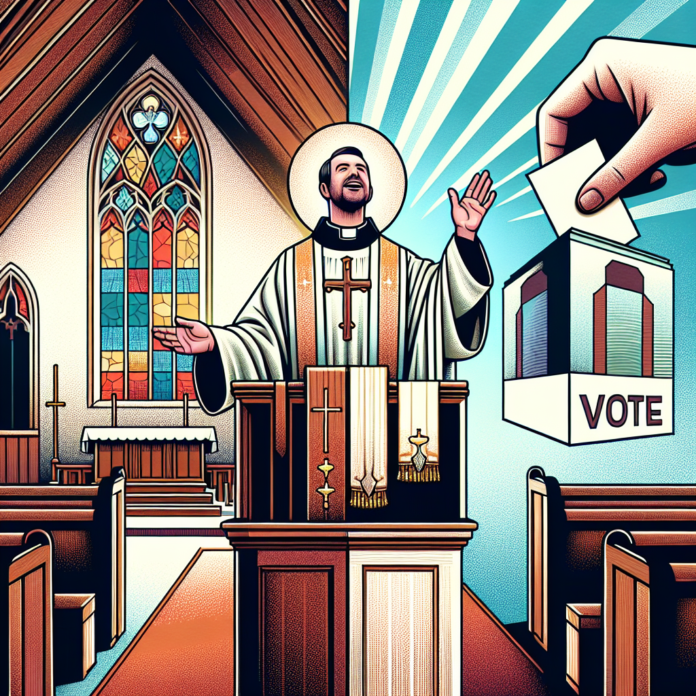Title: The Ethics of Priestly Voting Advice: Navigating the Complex Intersection of Faith and Politics
The intersection of faith and politics has always been a contentious battleground, particularly within the Catholic Church. Priests, as spiritual guides, hold significant sway over their congregations. The ethical implications of priests advising their flock on electoral matters have become increasingly relevant in today’s polarized political climate. While traditionalists often emphasize rigid adherence to doctrinal purity, a more progressive outlook aligns itself with the evolving societal values championed by Pope Francis. This article delves into the ethical ramifications of priestly voting advice, arguing for a nuanced and compassionate approach that respects individual autonomy and promotes social justice.
Historically, the role of the clergy in guiding political decisions dates back to the early days of the Church when bishops often wielded as much political power as they did spiritual influence. The Middle Ages saw the Papacy embroiled in the political machinations of European monarchies. During the Reformation, the relationship between church and state was particularly fraught, with religious leaders on both sides using their influence to sway public opinion and political outcomes.
In more contemporary times, the Catholic Church’s stance on political engagement has been guided by the principle of promoting the common good. The Second Vatican Council’s “Gaudium et Spes” articulated this approach, emphasizing that “the Church should not rely on privilege or politics.” This stance encourages a balanced engagement that promotes justice, peace, and the welfare of all, rather than specific partisan interests.
Yet, some factions within the Church have misinterpreted this guidance. Traditionalists, particularly those involved with the Latin Mass culture, have often used their authority to push a conservative agenda. This faction tends to focus narrowly on issues such as abortion and same-sex marriage, neglecting broader social justice concerns like economic inequality, racial injustice, and climate change. This selective morality undermines the Church’s more holistic mission to care for all of God’s creation.
Pope Francis has made significant strides in shifting the Church’s focus toward these broader issues. His encyclicals, such as “Laudato Si'” and “Fratelli Tutti,” emphasize the interconnectedness of all life and the importance of a communal approach to solving global problems. He has also been vocal in his criticism of unfettered capitalism and his calls for more humane treatment of migrants and refugees. By aligning the Church’s mission with progressive values, Pope Francis has underscored the ethical imperative for priests to guide their congregations in a way that transcends partisan politics.
Despite this more inclusive vision, there remains substantial opposition from conservative circles within the Church. These groups often view Pope Francis’s progressive stances as a betrayal of traditional values. However, this perspective fails to recognize that the core of Catholic teaching is not about maintaining the status quo but about responding to the signs of the times in a manner that respects human dignity and promotes the common good.
The ethical dilemma of priestly voting advice lies in the balance between spiritual guidance and political autonomy. A priest’s primary role should be to form consciences, not to dictate political choices. This requires a delicate balance: providing the moral framework within which an individual can make informed decisions, while avoiding endorsement of specific candidates or parties.
Ethically, it is problematic when priests cross these boundaries, particularly when they leverage their spiritual authority to promote a narrow, partisan agenda. This can lead to the erosion of individual conscience, a cornerstone of Catholic moral teaching. Instead, priests should focus on the underlying principles of Catholic Social Teaching – dignity of the human person, the common good, subsidiarity, and solidarity – which can guide the faithful in making morally responsible choices.
Furthermore, the politicization of the pulpit can alienate members of the congregation who might feel that their personal political inclinations are being judged. This is particularly concerning in a diverse Church that spans a wide spectrum of socio-political perspectives. A more pastoral approach that encourages dialogue, critical thinking, and active engagement with the issues is not only more inclusive but also more faithful to the Church’s mission of fostering a compassionate and just society.
In conclusion, the ethics of priestly voting advice must be carefully navigated to avoid the pitfalls of partisanship and authoritarianism. By emphasizing a holistic and inclusive approach, inspired by the progressive values championed by Pope Francis, the Church can better fulfill its role as a moral compass in a complex world. Priests should aim to empower their congregants to make informed and conscientious choices, respecting their autonomy while promoting the common good. This balanced approach not only upholds ethical standards but also aligns with the true spirit of Catholic Social Teaching, fostering a more just and compassionate world for all.
